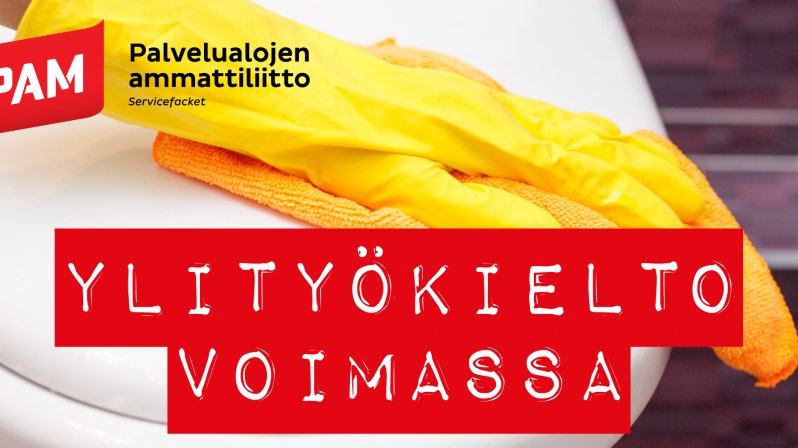What does an overtime ban mean? – Instructions can be found here
PAM announces overtime ban in facilities services sector – overtime ban starts on 1 February at 4 p.m. and is in place until further notice.
Today the Executive Board of Service Union United PAM decided to announce an overtime ban for workers in the facilities services sector. An overtime ban is legitimate industrial action. The collective agreement period in the facilities services sector ended yesterday. The sector is in a state of non-agreement, so that industrial action is legitimate.
Earlier today PAM announced that the employers’ proposals would weaken the collective agreement in the sector. These adverse proposals and the slow progress of the collective agreement negotiations have led to widespread dismay among workers in the facilities services sector.
PAM is trying to negotiate a collective agreement for workers in the facilities services sector. The collective agreement negotiations between PAM and the employers’ federation Real Estate Employers have not advanced. The overtime ban is meant to further PAM’s objectives in the collective agreement negotiations.
What does an overtime ban mean?
During an overtime ban workers do not work overtime. During an overtime ban workers do not accept overtime proposals made by employers.
Overtime is banned for all workers in the facilities services sector. During the overtime ban, external labour, or e.g. ad hoc use of agency workers or enlisting of workers are not acceptable.
During the overtime ban workers in the facilities services sector will refuse to work overtime if asked by employers to stay on.
Do not agree to overtime; it is voluntary anyway
Employers are not entitled to pressurise you to work overtime. Employees cannot be required to work overtime or be instructed to change their working time rota. Working overtime is always voluntary and requires the employee’s consent.
Why has an overtime ban been announced?
The Executive Board of Service Union United PAM announced an overtime ban starting at 4 p.m. on 1 February. The purpose of the overtime ban is to further PAM’s negotiating objectives and to enter into genuine negotiations with the employers. An overtime ban is legitimate industrial action.
What is overtime?
Overtime is work done after an 8-hour day or a 40-hour week. Employers also cannot instruct employees to work overtime above the 37.5 hours in the collective agreement up to 40 hours. If a compensatory system is used, employers cannot change previously agreed working time in the shift rota.
On-call duty during overtime ban
The overtime ban does not affect previously agreed on-call duty. During on-call duty, only work that cannot be postponed without risk to regular working time is to be done.
Overtime ban and emergency work
The overtime ban does not affect emergency work (Working Hours Act, Section 21). Emergency work can only be assigned under the extraordinary circumstances set out in the Working Hours Act. Employers must give a written statement of the reason for emergency work to the labour protection authorities. In practice emergency work means e.g. work that prevents life-threatening incidents from occurring.
When will the overtime ban end?
A separate announcement will be made when the overtime ban ends.
Further information and aid
Please contact the shop steward at your work place or PAMs closest regional office in case you have questions in regard of the overtime ban. Further information is also given by PAM's employment advice, tel. 030 100 620 weekdays from 9 am to 4 pm.



